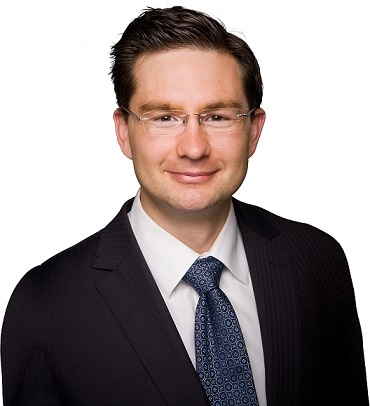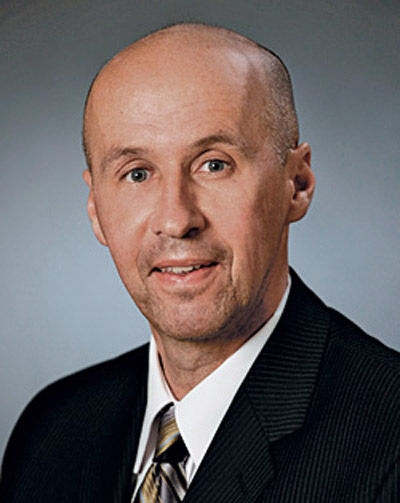
Political Power Brokers of the National Capital Region
“It would not take long for a future tax-and-spend government to imperil the economic stability Canada enjoys”: An Interview with Conservative MP Pierre Poilievre (Nepean-Carleton)
As told to Harvey F. Chartrand
Pierre Poilievre is the 34-year-old Minister of State (Democratic Reform) and four-term Conservative Member of Parliament for Nepean-Carleton.
After defeating the incumbent Liberal Defense Minister in the 2004 election, Poilievre has since been re-elected four times.
As Parliamentary Secretary to the Treasury Board President (2006-2008), Poilievre helped stick-handle the Federal Accountability Act through the House of Commons. As Parliamentary Secretary to the Prime Minister (2008-2011), he was the caucus lead on the Conservative Party’s 2011 election platform, where he pushed for spending reductions, less red tape for small business and tax fairness for families with a stay-at-home parent.
As Parliamentary Secretary to the Transport Minister (2011-2013), Poilievre launched a new House committee study on how competition and private sector investment can lower the costs and improve the quality of our roads, bridges and other infrastructure.
In 2005, Poilievre took the idea of a Children’s Fitness Tax Credit from an Osgoode farming family to Stephen Harper who campaigned on and implemented it.
It was also in Osgoode that he met Jim Duquette. The Army Major left to serve the Canadian Forces in the Middle East just days after the birth of his son. He returned to learn his parental benefits under EI had expired while he was serving overseas, depriving him of the chance to spend time with the son he had not seen in a year. Major Duquette learned that, according to the rules, he could have deferred his benefits for the purpose of serving a prison sentence, but not for the purpose of serving in a Canadian Forces mission.
Poilievre fixed this injustice, with the Fairness for Military Families Act. It allows soldiers to defer their parental leave until after they return from military missions, giving them precious time off with their small children.
As a leading voice for the future Strandherd-Armstrong Bridge, Poilievre has landed one-third of the project’s needed investment. Construction is now well underway as a result. He also secured the neighbouring airport land required for the Limebank Road expansion.
Poilievre was appointed Minister of State (Democratic Reform) on July 15, 2013.
The Interview
Ottawa Life: Under Stephen Harper, has Canada set itself on a course that the Liberals (should they be re-elected) can’t ever steer back to the way things were in 2006 under Paul Martin?
Pierre Poilievre: I don’t think anybody who runs on a platform of taking the country back a decade will ever win an election. Bill Clinton’s old campaign song was Don’t Stop Thinking about Tomorrow. All elections are always about the future. The Liberal Party has been trying to win elections on the promise of bringing back the good old days. Someone once said that the Liberal slogan should be: Towards a better yesterday. I don’t think the country wants to go back to the Liberal past. That being said, in the next election, I expect that all three parties will provide competitive visions for the future. We can’t take for granted that our vision will automatically win. That’s why we have to make sure our plan is the most meritorious and best-suited to the interests of the everyday Canadian voter. We can’t take for granted the gains we’ve made. If you look around the world right now, you’ll see that previously successful nations were able to squander their prosperity in a very short period of time, so the stability that we enjoy today is very much contingent on continued wise government.
Despite the fact that we kept our deficit spending and taxes low, it would not take long for a future tax-and-spend government to reverse that prudent management and imperil the economic stability we enjoy. I mean, 25 years ago, no one would have imagined that Detroit would be basically bankrupt or that Greece would be on the verge of economic collapse, but big-spending, irresponsible governments can do tremendous damage in a very short period of time. Unfortunately, the gains we’ve won are important, but they can’t be taken for granted.
Ottawa Life: What are some of the major problems facing Canada today, and how is the Conservative government dealing with them?
Pierre Poilievre: I’d like to focus on one principle challenge – the economy – and then identify some of the sub-categories. We face economic risk from abroad and those risks emanate from a number of serious mistakes that foreign governments have made. One is – they piled up unsustainable debt levels by spending money they did not have on things they did not need. That has brought several European countries to bankruptcy. Similar phenomena have emerged in a number of municipal and state-level jurisdictions in the United States. If there is a financial collapse of these governments, there is no question that Canada would face some of the indirect consequences. We sell products to these jurisdictions. We buy products from them. Our financial systems are necessarily integrated at some level, so we can’t expect to avoid all the consequences and mistakes of foreign governments, but we can avoid making those mistakes here in Canada.
That is why we’ve limited our borrowing. We plan to balance the budget within two years. We’ll be one of the first governments in the developed world to balance its budget and one of the only to do so without raising taxes. That would be an exceptional achievement. We have government debt levels in Canada that are about a third the size of the entire economy, which is very reasonable when you consider that in America it’s more than twice that. In Europe, many countries have bigger debt than their economy has output, so by comparison we’re doing extremely well. That’s the first thing we need to do to avoid the economic challenges from abroad.
The second thing is we need to do is to keep our taxes low. We want to attract the brightest and most hard-working people and companies from all around the world. That requires a low-tax environment, where people can invest and spend the resources that they’ve earned. We’ve managed to keep taxes very low. The federal tax burden is now at a 50-year low in Canada. We’ve cut taxes about 150 times. That has meant more money in the pockets of the average family. I think we need to continue that. As soon as we get the budget balanced and we have more surplus, we need to lower taxes again to help Canadian families get ahead and to make our economy more competitive for the future.
Third, we need to trade more. Trade gives companies a world of consumers and our consumers a world of choice. So we’re working to conclude a free trade agreement with Europe, which is the biggest economy in the world, and India, which is the second most populous nation and one of the fastest-growing (economies), and we’re hoping that we can conclude agreements with these two jurisdictions and give our companies a whole new advantage. We’ve got to avoid being too reliant on the United States. As we’ve seen through some of the trade disputes we’ve had and the difficulties our American friends have suffered, we need alternatives and intercontinental trade (with other countries) would give us those alternatives.
Fourth, we need to keep our red tape and our administrative burden light, so companies can build a mountain of success rather than drowning in a sea of paper.
Fifth, we need to continue to reorient our immigration system to attract people our economy needs. There are certain sectors in our economy that have grave labor shortages. There are people from around the world who want to work in Canada and have the necessary skills to fill those shortages. Our goal is to reorient our immigration system to bring (skilled workers) into our country.
Ottawa Life: What other legislation are you working on?
Pierre Poilievre: My two major projects over the next year will be to push for Senate reform. There has been a lot of debate over what the federal government can do in our Constitution without involving the provinces. So we’ve asked the top court in the land to answer those questions for us. The hearings will start in November and the results will come back next year. We’re hoping the Supreme Court will give us a how-to guide on Senate reform. If the results come back as we hope, then we should be able to bring in term limits for Senators, and also allow provinces to hold elections and recommend candidates for the Senate for the Prime Minister’s appointment. Those would be two important incremental steps towards a more democratic and accountable Upper Chamber. But we need to wait until we hear back from the Supreme Court in how we can achieve those objectives. Secondly, we’ve committed to updating Canada’s election laws, so in the coming session, we’ll be introducing legislation to do that.
Ottawa Life: What do you think of Justin Trudeau as Prime Ministerial material? What effect would his leadership have on the country?
Pierre Poilievre: This is not a vote for Canadian Idol. The next election will be a serious decision about the future of our country. The Government of Canada is a quarter-trillion-dollar enterprise, over which the Prime Minister is effectively the CEO. He has to make life-and-death decisions on everything from terrorism to violence in the Middle East, to protecting our economy here at home. I don’t think people are going to entrust that kind of role to someone whose only platform is to legalize marijuana. So far, we’ve seen literally nothing else from him. He has no agenda for the country and he’s now said that he won’t tell us what his plans are for at least another two years. At the end of the day, elections are about choosing someone who can execute very important responsibilities and they are not mere popularity contests. As we get closer to that decision date, I think peoples’ prudential instincts will remind them of that.
Ottawa Life: I’d like to ask you about the NCC and if anyone is ever going to fix it and if we’ll ever have an organization in place that actually does something to benefit the national capital. What accounts for the NCC’s phenomenal incompetence? What is the NCC’s real purpose at the present time?
Pierre Poilievre: The basis for the NCC is to try and elevate the capital in the interests of the whole country. Naturally, when we have two bodies that deal with one city, there is going to be some regular tension. You’ve got the City of Ottawa, which is a municipal government, and then you’ve got this unique body that no other city in the country has to face, because we’re the only capital there is. So we have to work every day to make the NCC more practical and responsive to peoples’ needs. I’ve actually noticed a few improvements. As an MP in the National Capital Region, I have a whole level of local responsibilities that most MPs wouldn’t face. The NCC must be the biggest landowner in my riding, if not then very close to it. They own the Greenbelt, which goes right through part of my riding, then on the South Gloucester side, there are a lot of federal lands that the NCC has input over, so anytime the municipality wants to do anything, the NCC has to approve it. When I first took office back in 04, the NCC was very bureaucratic and unresponsive. I found a slow progressive improvement in dealing with basic problems with the NCC. When we rebuilt Limebank Road, the NCC was one of the fastest agencies to get their approval out of the way. The NCC gave us no problems with the construction of the Strandherd-Armstrong Bridge. And I rarely ever hear a complaint from a resident about NCC policy on the surrounding lands, so there has been some improvement. That is why I hesitate to get into talk about fundamentally reforming the NCC, because we’ve been talking about that for years. I’d rather talk about how we can address individual problems that come up, so if a constituent or a city councillor is having a problem with the way the NCC is handling an issue, I just try to tackle that one issue, because finding a city-wide and then national consensus on NCC reform is much more difficult than just dealing with each problem as it comes up. I guess that’s kind of a Canadian response: slow, incremental improvement.
Ottawa Life: What accounts for this new spirit of cooperation with the NCC?
Pierre Poilievre: They faced relentless public criticism about ten years ago and realized that if they didn’t become more responsive to the local population, they wouldn’t survive as an agency. I think the NCC has changed its culture somewhat towards a more service-based culture. I know that if I call to ask and say: look, a constituent has a problem with the way the NCC is building a pathway on the Greenbelt, I get a call back, a very substantial response within less than 24 hours. They try to meet with people in the community very quickly. When I first started off about ten years ago, dealing with the NCC was just like pulling teeth. I think the NCC has learned it needs to serve the community in order to maintain public support. So in my neck of the woods, I’ve noticed an improvement at the NCC.








